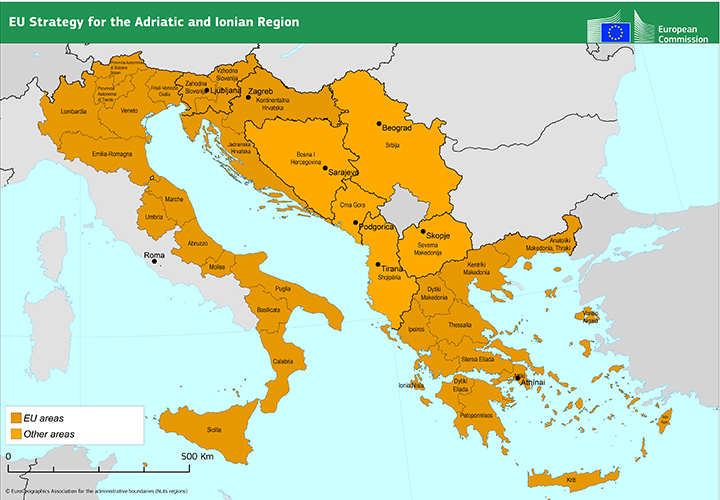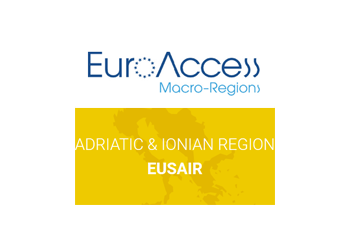EU Strategy for the Adriatic and Ionian Region
NEWS
Adopted by the European Council on 29 September 2014, the EU Strategy for the Adriatic and Ionian Region (EUSAIR) is a tool to foster social, economic and territorial cohesion to reduce disparities in the Adriatic-Ionian macro-region through cooperation.
The strategy involves ten countries: four EU Member States (Greece, Croatia, parts of Italy, Slovenia), five candidate countries (Albania, Bosnia and Herzegovina, Montenegro, Serbia, and North Macedonia), and a third country, San Marino.
In accordance to the EU priorities for 2019-2024, EUSAIR contributes to the European Green Deal, European digital strategy and a stronger Europe in the world.

EUSAIR builds bridges between people, cultures, and economies to foster stability, peace and unity in Europe. Strengthening cooperation in the Adriatic-Ionian region helps to promote political and economic stability, thus creating a solid base for the process of European integration. Being a flexible cooperation framework not bound to regulation, it gives room for address existing and newly occurred challenges to find joint solutions. It accomplishes this by working on a multi-level governance structure, enabling conditions from top-down to bottom-up. In various meetings such as the EUSAIR annual fora, financial dialogue meetings and more, government official and representatives from civil societies, academia, research, businesses or youth organisation gather to discuss project ideas, initiatives and financial opportunities to foster economic growth and prosperity.
The participating countries cooperate on areas of common challenges agreed upon in the Acton Plan but not exclusively. This rolling document comprises objectives for four thematic pillars: blue growth, connecting the region (Energy and Transport), environmental quality, and sustainable tourism.
Cross-cutting issues concern capacity building and research and innovation and SME development.
At the Annual Forum in Catania 2018, EUSAIR recognises the importance youth for the development of the macro-region and to give them a platform for their ideas. Since then, various initiatives were launched such as the EUSAIR YOUNG POPRI event for young entrepreneurs, the EUSAIR youth contest, EUSAIR4Youth or the EUSAIR Communication Academy for young people to educate and train young people to become active. The EUSAIR Youth Council will soon further enrich the strategy by including young people into the governance structures to support the implement the objectives of the EUSAIR Action Plan
To find more information and news about the strategy please go to the EUSAIR website
Cooperation within EUSAIR is attractive for candidate and potential candidate countries (IPA countries). While the enlargement process is based on a bilateral, hierarchical process, EUSAIR is one of the few cooperation instruments in the region, where EU Member States and IPA countries cooperate on equal footing on different sectors and EU initiatives. The rotating EUSAIR chairmanship is one example for IPA countries to steer the priorities of the region for twelve months from June to May and to shed light on specific challenges for the Western Balkans and the macro-region on European level. By opening and extending EU rules and regulations to IPA countries, it supports their enlargement process in various chapters and in understanding the capacity needs to manage Cohesion funds under shared management.
Support to enlargement chapters
Capacity-building is relevant for the Western Balkans in advancing with chapter 22 (Regional Policy and Coordination of Structural Funds) of the acquis communautaire, as herein negotiations for the EU enlargement process are relevant to prove the country’s absorption capacities of EU funds as well as clear enabling conditions for Cohesion Policy. Overall, by supporting advancement in chapter 22, the EUSAIR can boost the Western Balkans’ capacity to implement policies in a wider sense by improving the planning, managing and controlling capacities of Cohesion funds and other relevant EU funding possibilities.
Cooperation within the four pillars has a direct link to support IPA countries in advancing with various chapters for the enlargement process .
Pillar 1 – Blue Growth (Pillar Coordinators: Greece and Montenegro)
Pillar 1 is linked to chapter 13 (fisheries) and chapter 25 (science and research) of the acquis communautaire (acquis) and to the objectives of the European Green Deal. The EUSAIR Action Plan highlights how actions in the sectors of fisheries and aquaculture, as well as in the blue technologies, need to build on the Smart Specialisation Strategies developed at regional and national level.
Pillar 2 – Connecting the Region, sub-groups Energy and Transport (Pillar Coordinators: Italy, Serbia and North Macedonia)
Pillar 2 relates to chapter 14 (transport), 15 (energy) and 21 (trans-European networks) of the acquis. As the transport and energy infrastructure in the Western Balkans has yet to tap its potential, EUSAIR’s flagship projects could support legislative alignment, enforce monitoring, data collection, and simulate modelling in transport networks for strategic project development to improve transport and energy connectivity in the Western Balkans and to the rest of Europe.
Pillar 3 – Environmental Quality (Pillar Coordinators: Slovenia and Bosnia and Herzegovina)
Pillar 3 contributes to chapter 27 (environment) of the acquis. As nature knows no borders, this pillar serves as a horizontal principle for each EUSAIR pillar and activity to reach the goals of the EU Agenda of the Western Balkans and the European Green Deal in a coordinated and efficient manner to preserve the marine and terrestrial biodiversity and to reduce air and sea pollution.
Pillar 4 – Sustainable Tourism (Pillar Coordinators: Croatia and Albania)
Pillar 4 has a focus on various chapters as tourism is highly interlinked to chapter 20 (enterprise and industrial policy) and chapter 26 (education and culture) of the enlargement process. The EUSAIR is in a strategic position to support the Western Balkans recovery in the tourism sector from the COVID-19 pandemic and strengthening its resilience though the twin transition. Combined with its outstanding natural beauty, cultural, historic and archaeological heritage, EUSAIR has a strong asset to strengthen a macro-regional identity and brand to expand its market and seasonality.
The EUSAIR does not come with extra EU funds but is supported by resources of existing EU, national and regional funds according to an integrated approach.
Interreg programmes provide valuable support to the implementation of the EUSAIR cooperating in the macro-region. Especially the Interreg IPA ADRION programme, covering the same area as the EUSAIR, offers financial means to implement projects of macro-regional importance e.g. by funding the Facility Point to assist the EUSAIR governance structure. In accordance to article 15 of the Interreg regulation (EU) 2021/1059, the Interreg IPA ADRION will invest 80% of its total budget of 160.810.020 EUR (EU contribution 13.688.515 EUR and 24.121.505 EUR national contribution) to the priorities of the EUSAIR.
In 2018, the Foreign Ministers of the EUSAIR signed the Catania Declaration , laying down the necessity for the embedding process, i.e. to embed EUSAIR flagship projects into programmes of Cohesion Funds and of the IPA III programming framework. These funds bundle significant opportunities that go beyond Interreg funds to invest in hard projects needed e.g. for activities within both sub-groups of Pillar 2.
In June 2020, the EUSAIR Governing Board approved the flagship projects per pillar. It followed strategic and coordinated consultations with Managing Authorities of Cohesion Funds for EU Member States as well as with National IPA Coordinators of the IPA III programming framework and DG NEAR for the IPA countries to be embedded into the 2021-2027 programming period.
More about financial opportunities https://www.adriatic-ionian.eu/funding-sources/
- Support the integration of the Western Balkans
- To provide political and financial support to foster good neighbourly relations in the region
- To support regional cooperation, to boost economic development, improve connectivity, and enhance security
- To promote shared values and the unity in diversity of the rich cultural heritage of the macro-region
- To support the development of sustainable tourism and its ecosystems in one of Europe’s most popular destinations
- In April 2020, the request of North Macedonia to join the EUSAIR has been accomplished, followed by San Marino in February 2022.
- Approval of the flagship projects in June 2020
- In 2021, the NAMIR project (North Adriatic Maritime Incident Response System) of Pillar 3 received co-financing by the European Union Civil Protection Mechanism is the partial realization of the first EUSAIR flagship. The project will establish cooperation mechanisms and measures ensuring a high level of preparedness and response in the situation of a sudden marine pollution by Slovenia, Croatia, and Italy.
- Various mono-pillar project and cross-pillar project ideas have been developed into bankable projects ready to be submitted for call for proposals
To get in contact with the EUSAIR team in DG REGIO, please email the secretary of the REGIO. DDG.D1: REGIO-TRANSNATIONAL-AND-INTERREGIONAL-COOPERATION@ec.europa.eu. For more information on how to get in contact with EUSAIR stakeholders, please visit the EUSAIR website .

